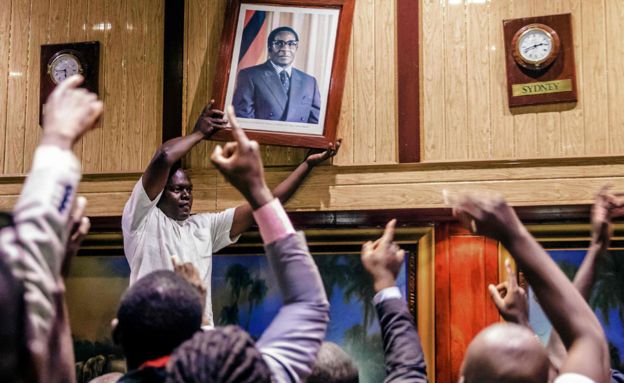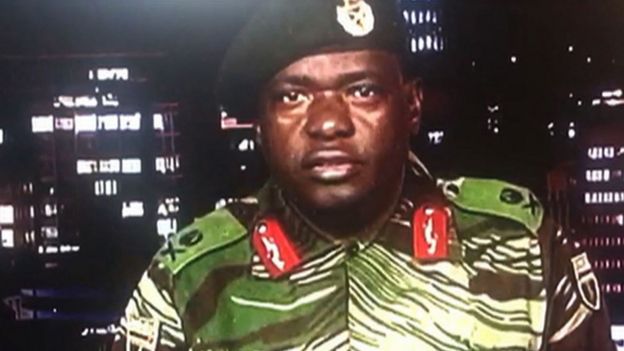Umeambiwa Kuna Video/Picha,
WhatsApp Group
au Namba za Mrembo
BONYEZA HAPA KUFUNGUA
TANGAZO
Critics have said that it has dashed hopes of change in the country.
Mr Mnangagwa was inaugurated as president last week. He took over from Robert Mugabe who had been in power for 37 years.
Mr Mugabe stepped down after the army took control of the country, following a power struggle in the ruling party.
Thousands of people celebrated Mr Mugabe's resignation as they hoped the failed economy would improve.
Some had hoped that President Mnangagwa would appoint members of the opposition to his cabinet, to form a transitional government until elections next year but this did not happen.
What has been the reaction?
The appointments led government critic Tendai Biti to suggest that Zimbabweans were "wrong" to have hoped for change."Up until now, we had given the putsch the benefit of the doubt. We did so in the genuine, perhaps naive view that the country could actually move forward. We craved change, peace & stability in our country. How wrong we were," he said.
 AFP
AFP
Wilf Mbanga, a Zimbabwean journalist who lives in exile in South Africa, told the BBC that the new minister of agriculture Perence Shiri "was not known for his love of democracy".
A minister who served in Mr Mugabe's government, Jonathan Moyo, said the changes meant that Zanu-PF, the party which has governed Zimbabwe since independence in 1980, was "dead" and the military was now in charge.
Newspaper owner Trevor Ncube said the cabinet was "very disappointing".
"Largely the same people that caused this crisis have been recycled. The honeymoon comes to an end and reality dawns. His concern seems to have been rewarding those who brought him to power and Zanu-PF unity," he said.
Who are the most controversial new cabinet members?
 DEWA MAVHINGA
DEWA MAVHINGA
Sibusiso Moyo, the general who became the face of the recent military takeover, is the new foreign minister.
In his announcement, he was at pains to deny that the military takeover was a coup so some will criticise his promotion to the cabinet.
He holds a PhD in International Relations and at one point was the leader of the elite military unit, known as the "green berets squad".
The head of Zimbabwe's air force, Perence Shiri, was named the minister of agriculture and land affairs.
He is notorious for having led the military operation against those seen as opponents of Mr Mugabe in Matabeleland in the early 1980s.
The operation, led by the North-Korean trained Fifth Brigade of the army, resulted in the killing of an estimated 20,000 civilians.
As lands minister, he will presumably be in charge of Zimbabwe's controversial land reform programme.
This saw the seizure of thousands of farms owned by the white minority which had previously been in charge of the country. Critics say this wrecked Zimbabwe's once thriving economy and led millions of Zimbabweans to leave the country to find work.
Who else got a job?
Aside from Maj Gen Moyo and Air Marshal Shiri, leaders of the powerful war veterans' association, who pushed for Mr Mugabe to go after the military intervention, also got cabinet jobs.
Chris Mutsvangwa, who heads the group, is now in charge at the information ministry.
Critics say that Mr Mnangagwa has rewarded those whose actions led to him becoming president.
Why did the military intervene?
There was a power struggle over who might replace the 93-year-old president, with Mr Mnangagwa and Mr Mugabe's wife, Grace, on opposite sides.
Mr Mnangagwa was accused of plotting to take power and Mr Mugabe sacked him as vice-president.
Emoticon Emoticon